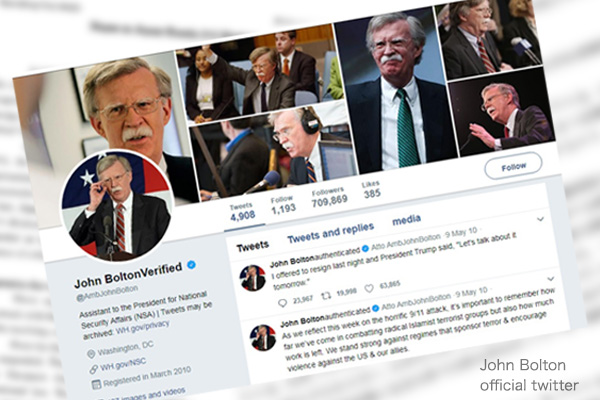John Bolton has left his position as national security adviser in the U.S. Trump administration. His presence in the administration was particularly big on North Korea. Bolton was not only an ideologically clear hardliner but also the sole expert in the nonproliferation of weapons of mass destruction among senior administration officials. Under the George W. Bush administration, Bolton served as undersecretary of state for arms control, nonproliferation and disarmament before being appointed as ambassador to the United Nations to work out U.N. Security Council sanctions resolutions on North Korea. He is well versed in the definition of “denuclearization” and “nuclear materials,” various loopholes involving nuclear inspections and North Korea’s negotiation tactics.
If State Department negotiators asked the president to accept a new “epoch-making” North Korean proposal, Bolton would have described the proposal as a copy of a loophole-studded proposal used to deceive then Secretary of State Condoleezza Rice and Assistance Secretary of State Christopher Hill in the Bush administration, contributing to preventing any easy decision to ease sanctions on North Korea.
Trump’s misunderstanding
Even President Trump should not like to cut a “bad deal” with North Korea. The problem is whether he has advisers around him who can accurately judge on what deal is bad. Secretary of State Mike Pompeo is not an appeaser at all, but he is not an expert in nonproliferation. Military leaders including the chairman of the Joint Chiefs of Staff are basically professionals for carrying out military operations and may not be specifically familiar with nuclear nonproliferation negotiations. So may be Defense Secretary Mark Esper hailing from the Army.
“He (Bolton) made some very big mistakes,” President Trump told reporters after Bolton’s resignation. “When he talked about the ‘Libyan model’ for Kim Jong Un, that was not a good statement to make... And it set us back (in negotiations with North Korea).” The remark represents President Trump’s lack of knowledge about the Libyan model.
The Libyan model for nuclear nonproliferation means that sanctions would be lifted after nuclear materials are shipped overseas and thorough inspections confirm the dismantlement of nuclear weapons. It does not include any regime change. In fact, Libya’s Moammar Gaddafi regime prospered thanks to oil exports after sanctions were lifted in exchange for denuclearization. The regime was overthrown later amid the Arab Spring peoples’ uprisings that swept the Middle East. The regime change had nothing to do with the Libyan model of denuclearization.
Don’t ease sanctions before denuclearization
However, the Libyan model has been misunderstood by President Trump and others as designed for a regime change after denuclearization. Building on the misunderstanding, North Korea relentlessly asked the United States to oust Bolton.
The Libyan model for North Korea’s denuclearization means that sanctions on North Korea would be lifted only after its denuclearization is confirmed, or that maximum pressure would be maintained until the denuclearization is confirmed. In the original meaning of the word, seeking the Libyan model is right. Bolton warned that the United States should not accept North Korea’s proposal for gradual and reciprocal measures that represented an attempt to win the relaxation of sanctions in exchange for nothing. We must keep the Bolton warning in mind.
Yoichi Shimada is a Planning Committee member at the Japan Institute for National Fundamentals, and a professor at Fukui Prefectural University. He follows U.S. politics and foreign policy.


